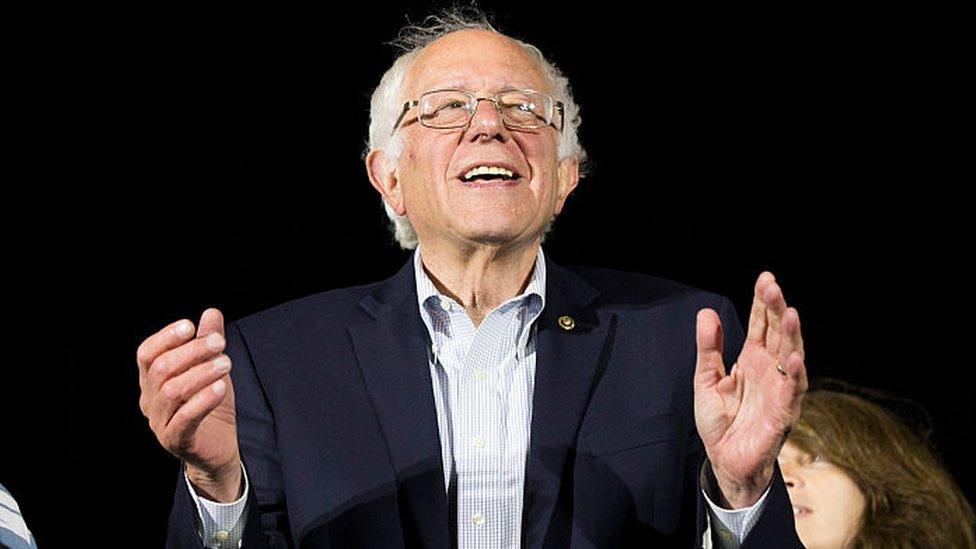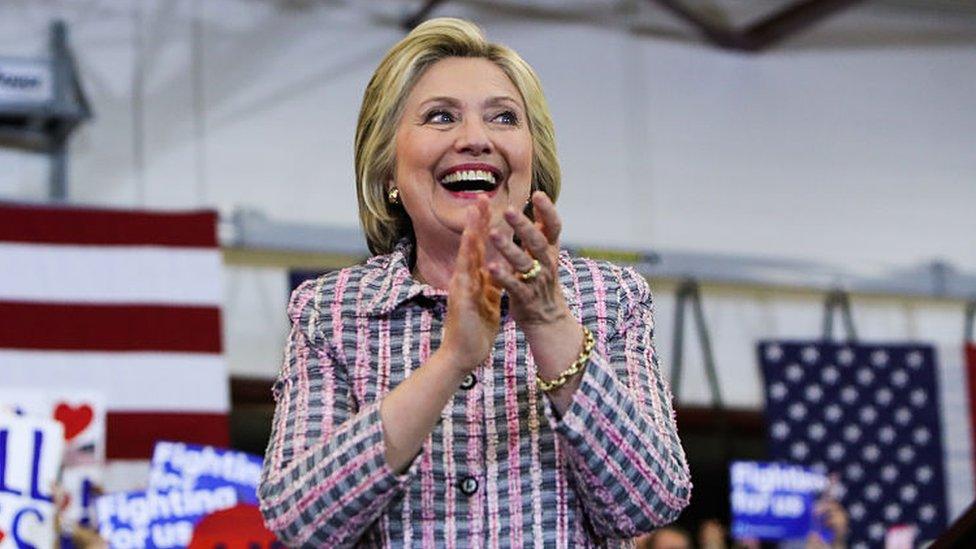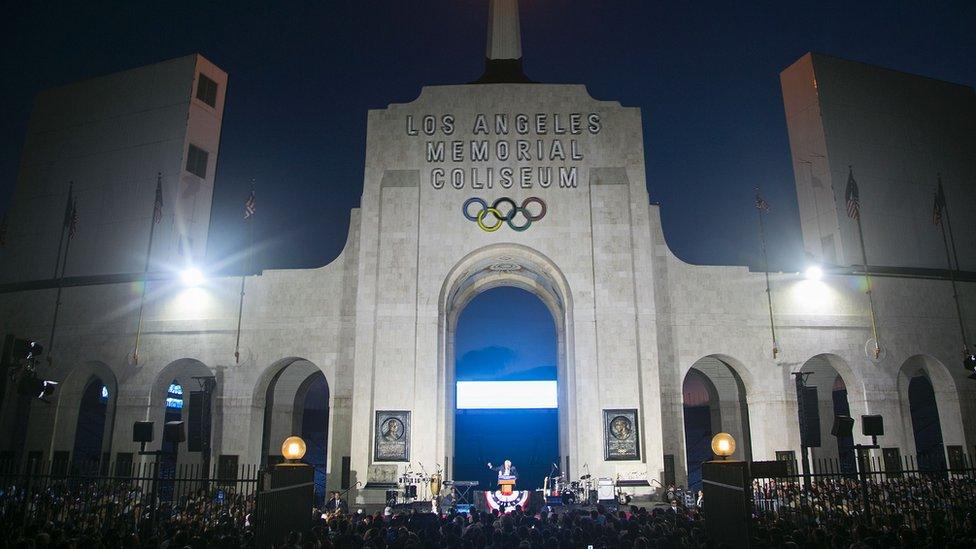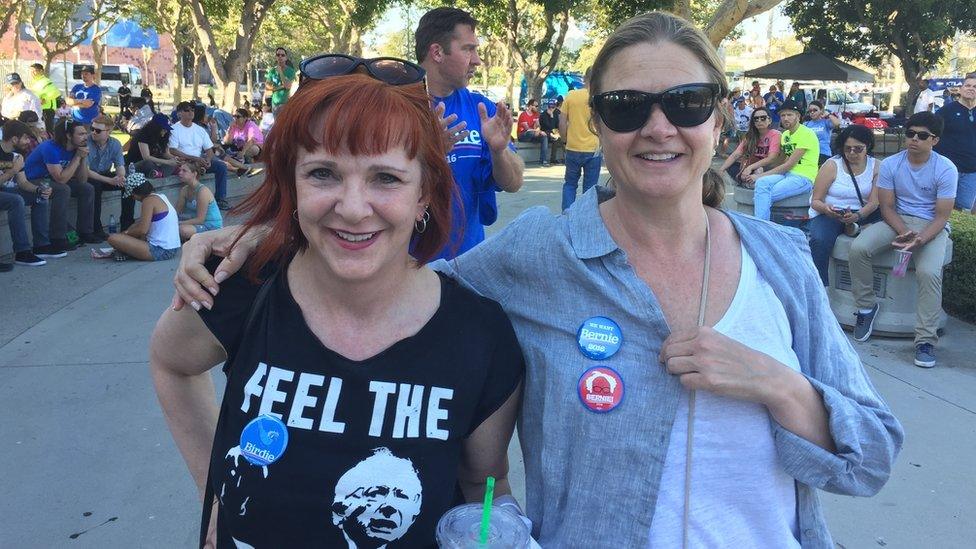Sanders sees salvation in California
- Published

For Bernie Sanders and his die-hard supporters, California - the Golden State - is his golden ticket.
Yes, Hillary Clinton's lead in pledged delegates and total votes, as well as her vast advantage among the "superdelegate" party officials and officeholders, means she likely will accrue the necessary support on Tuesday to be the nominee even before polls close in California.
But the Sanders campaign is asserting that a win on the west coast, where surveys show the race is close, will fuel his efforts over the coming weeks, setting the stage for a showdown with Mrs Clinton on the floor of the Democratic convention in July.
At a press conference in Los Angeles on Saturday morning Mr Sanders emphasised this point, urging the reporters in attendance to refrain from calling Mrs Clinton the presumptive nominee.
"I have heard reports that Secretary Clinton has said it's all going to be over on Tuesday night," Sanders said. "I have heard reports that the media, after the New Jersey results come in, are going to declare that it is all over. That simply is not accurate."
The Vermont senator's pitch is that, unencumbered by Mrs Clinton's low approval ratings and controversy surrounding her use of a private email server while at the State Department, he's the better candidate to run against Republican Donald Trump in the autumn general election.
His team points to numerous opinion polls, external showing that he performs better in hypothetical presidential matchups than Mrs Clinton. (Clinton's team counters that his numbers are inflated because he's largely stayed above the fray on the campaign trail).

Hillary Clinton is on the verge of securing the Democratic nomination - if her super-delegates stick with her
After Tuesday, when all but the District of Columbia will have held their nomination contests, Mr Sanders will no longer be able to make that case to most American voters.
His goal, then, will be to convince enough superdelegates - who are not officially committed to a candidate until they cast their ballots at the Democratic convention - to switch their support to him. A win in California, the nation's most populous state, would feature prominently in his closing arguments.
"At the end of the nominating process no candidate will have enough pledged delegates to call the campaign a victory," Mr Sanders said. "They will be dependent upon superdelegates. In other words, the Democratic National Convention will be a contested convention."
It's a long-shot strategy. California success hardly helped Mrs Clinton in 2008, when Barack Obama - with the support of superdelegates - defeated her in that Democratic nomination race. And unlike Mrs Clinton eight years ago, Mr Sanders is running an outsider's anti-establishment campaign that hasn't exactly generated a lot of enthusiasm among the Democratic power players and long-time party stalwarts who comprise the bulk of the superdelegates.
It's the only play Mr Sanders has left, however.

Bernie Sanders has shown no signs of conceding as he campaigns across California
According to polls, Mr Sanders' California supporters understand the precarious nature of their man's campaign. A CBS survey, external found 43% of them are voting for him because "he still has a good chance to win the nomination". The rest are doing so primarily "to help influence the direction of the party".
For Sanders' true believers, however, the cause is far from lost. As the sun set over the Pacific Ocean on Saturday, they gathered for an evening of music and speeches in the shadow of the Los Angeles Memorial Coliseum. For them, the nomination is still within reach - and California holds the key.
A victory there would give the Democratic National Committee something to think about, said Los Angeles resident Bruce Purcell, who was one of the estimated crowd of 14,000 in attendance on Saturday night.
Such a result "would add tremendous momentum and change the narrative," Jugo Romero, a 25-year-old project co-ordinator, asserted, "especially for all those superdelegates who committed to Hillary before any votes were cast."
He added that although he would support Mrs Clinton if she does eventually become the nominee, she should be careful not to declare victory too soon.
"It would further alienate Bernie supporters who are still on the fence on supporting her."

Anna Little (left) and Lynett Gracey say Hillary Clinton is no better than Donald Trump
For other Sanders backers, it is already too late for Mrs Clinton.
"If it's between Clinton and Trump, I don't know who's more dangerous," Anna Little, sporting a "feel the Bern" T-shirt, said. "I'm not going to vote for either of them." She added that she may back the Green Party in such an eventuality, but she is convinced a Sanders win in California will help superdelegates "wake up to their consciences".
Her friend Lynette Gracey agreed.
"I just don't see how she'd be much of an improvement over Trump," she said. "Trump's a dangerous guy, but so is she. Look at what she's condoning. Look at who's funding her campaign."
Filmmaker Michael Moore says anything could happen in the US presidential election.
As the Democratic race approaches its conclusion, and Mrs Clinton's lead has become increasingly secure, a litany of party elders have quietly and not-so-quietly urged Mr Sanders to find a way to gracefully exit the race and instruct his followers to fall in line behind the former secretary of state.
Over these last few frenzied days of campaigning in California, however, there appears little indication of an impending denouement.
"I'd love for him to keep fighting," said Alexis Bristor, a 25-year-old television editor. "It's no fun to give up. It's like any kind of a team - you don't just give up when you're 50 down."
In a revolution, which is what Mr Sanders calls his campaign, there is never a final defeat. Only eventual triumph delayed.
"Any objective analyst of the current campaign understands that the energy and the grass-roots activism of this campaign is with us, not Hillary Clinton," Mr Sanders said in San Diego Sunday night.
It's not that Mr Sanders and his most dedicated supporters aren't going down without a fight. It's that they're not going down at all.
- Published24 May 2016
- Published17 May 2016
- Published4 May 2016